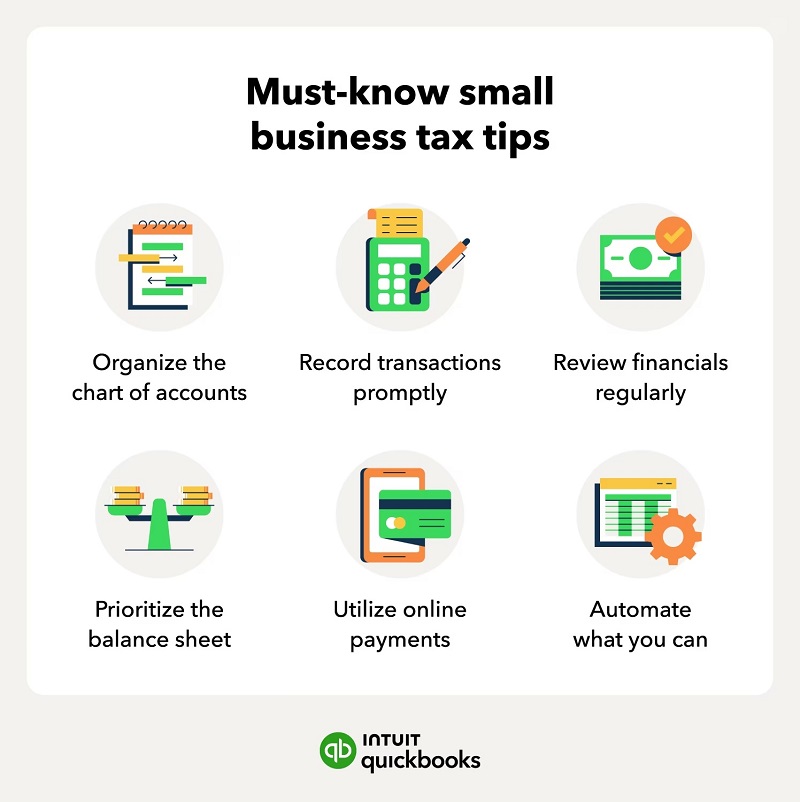
Do I need an accountant if I have a bookkeeper?
January 18, 2024
From Cash-Strapped to Cash-Confident: The Cash Flow Guide for Entrepreneurs
February 2, 2024Part 1: Small Business Tax Tips: Conquer Filing Season with Confidence
Navigating the labyrinthine world of taxes can be daunting, especially for small business owners. With limited resources and competing priorities, tax season often feels like an unwelcome guest at the feast of entrepreneurship. However, fear not! By equipping yourself with the right knowledge and tools, you can transform tax time from a chaotic scramble into a confident stride towards financial success.
Setting Up for Success
Before diving into the depths of specific filings and deductions, let’s solidify your foundation. These initial steps will ensure you’re prepared to approach tax season with clarity and organization.
Understanding Your Business Entity and Tax Obligations:
- Know your type: Sole proprietorship, LLC, C-corporation, or S-corporation? Each entity incurs different tax implications and filing requirements. Familiarize yourself with the pros and cons of each to make an informed decision for your business.
- Tax implications: Explore how your chosen entity is taxed on profits, losses, and payroll. Understanding these nuances will guide your financial decisions throughout the year.
- IRS resources: The IRS website provides valuable information on tax obligations for each type of business entity. Don’t hesitate to delve into their publications and online tools.
Tax Registration and Compliance Basics:
- Obtain an EIN: An Employer Identification Number (EIN) acts as your business tax ID. Apply for it directly through the IRS website to ensure smooth future transactions.
- State and local requirements: Research any additional registrations required by your state and local authorities. Compliance is key to avoiding unwanted penalties.
- Accounting systems and recordkeeping: Establish systems for meticulously tracking income, expenses, and inventory. Invest in reliable accounting software or implement a well-organized physical system.
Essential Deductions and Credits for Small Businesses:
- Maximize your deductions: Many common business expenses are eligible for deductions, including home office, travel, meals, and equipment. Familiarize yourself with these opportunities to lower your taxable income.
- Leverage Section 179: This powerful deduction allows you to deduct the full cost of certain business equipment in the year of purchase. Consider strategic equipment investments to optimize your tax benefits.
- Tax credits for growth: Explore available tax credits that incentivize research and development, hiring, and energy efficiency. Utilizing these credits can provide valuable financial boosts for your growing business.
Choosing the Right Tax Software or Accountant:
- Software options: Popular tax software solutions like TurboTax or QuickBooks cater to the needs of small businesses. Consider your comfort level and technological savviness when making a choice.
- When to hire a pro: For complex business structures or financial situations, consult a qualified tax accountant. Their expertise can save you time, money, and potential headaches.
- Finding the right fit: Look for an accountant with experience in your industry and a personalized approach that aligns with your business goals.
By laying this foundational groundwork, you’ve taken the first crucial step towards conquering tax season with confidence. In Part 2, we’ll delve deeper into navigating the actual filing process, ensuring you minimize stress and maximize tax efficiency for your growing business.
Remember, knowledge is power, and when it comes to taxes, this power translates into financial freedom and entrepreneurial success. Stay tuned for Part 2, where we’ll equip you with the practical tools and insights to confidently tackle tax season head-on!

Part 2: Conquering Tax Season: Navigating the Filing Process
With your tax foundation firmly in place, we now shift gears to the heart of the matter: filing your tax return. Armed with the following tips and tricks, you can navigate this crucial season with efficiency and accuracy.
Recordkeeping and Documentation Best Practices:
- Track everything: Maintain meticulous records of income, expenses, and inventory. Invest in a reliable system, digital or physical, to ensure organized and accessible data.
- Receipt retention: Don’t underestimate the power of a humble receipt. Digitize or securely store your receipts for all business-related expenses to support your deductions and claims.
- Regular backups: Data disasters happen. Ensure your records are always safe by implementing a regular backup system for both digital and physical documents.
Common Tax Challenges for Small Businesses:
- Independent contractor vs. employee: Properly classifying workers is crucial. Misclassifications can trigger hefty penalties. Familiarize yourself with the IRS guidelines and seek professional guidance if unsure.
- Audit preparedness: While audits may seem daunting, being prepared significantly reduces the anxiety. Keep your records well-organized and readily accessible for any potential inquiries.
- Common filing errors: Double-check for common mistakes like incorrect calculations, missing forms, or missed deductions. Utilizing tax software or consulting an accountant can minimize these errors.
Filing Your Tax Return Electronically:
- Embrace e-filing: This secure and efficient method ensures faster processing and minimizes errors. Most tax software and the IRS website offer e-filing options for various business entities.
- Choosing the right form: Understand which form applies to your business entity (e.g., 1040, 1040EZ, 1065, 1120). Downloading the correct form and familiarizing yourself with its structure will streamline the process.
- Deadlines and extensions: Adhere to filing deadlines to avoid late penalties. If necessary, you can request an extension for additional time to file.
Tax Payment Options and Avoiding Penalties:
- Calculate estimated taxes: Throughout the year, make estimated tax payments based on your anticipated income. This helps avoid hefty penalties at the end of the year.
- Electronic payment options: Take advantage of convenient electronic payment options to ensure timely and secure tax payments.
- Penalty prevention: Staying organized and proactive is key to avoiding late filing and payment penalties. Don’t let avoidable fees bite into your hard-earned profits.
Planning for Next Year:
- Tax forecasting: Utilize available tools and resources to forecast your future tax liability. This proactive approach allows you to make strategic business decisions throughout the year to minimize your tax burden.
- Mid-year adjustments: Regularly assess your financial situation and make mid-year adjustments to your business activities or tax estimations if needed. This ongoing optimization ensures you stay on track for tax efficiency.
- Tax-efficient business strategy: As your business grows, consider incorporating tax-efficient strategies into your decisions. Consulting with a qualified tax professional can help you navigate these complexities.
By embracing these strategies and maintaining organized records throughout the year, you can transform tax season from a dreaded event into a manageable process. Remember, knowledge is your compass, and with the right tools and insights, you can navigate the ever-changing tax landscape with confidence.
Bonus Tip: Don’t be afraid to seek professional help. A qualified tax accountant can provide invaluable guidance and ensure you’re maximizing your deductions and minimizing your tax burden.
Now, go forth and conquer tax season!

FAQs:
- Q: Do I need to file a tax return even if I had no income?
A: Yes, even if you had no income for your business, you still need to file a tax return to report your zero income. This helps maintain your good standing with the IRS and avoids potential penalties for non-filing.
- Q: What if I made a mistake on my tax return?
A: If you discover an error on your already filed tax return, you can file an amended return (Form 1040X) to correct the mistake. Act quickly, as there are time limits for filing amended returns.
- Q: Can I deduct my home office if I work from there occasionally?
A: You can deduct a portion of your home office expenses if you regularly and exclusively use it for your business needs. There are specific requirements and calculations involved, so consult the IRS guidelines or a tax professional for details.
- Q: What happens if I get audited?
A: An audit is a review of your tax return by the IRS to ensure accuracy. Although stressful, it’s important to remain calm and cooperative. Gather all necessary documentation and consider seeking professional guidance from a tax accountant.
- Q: How can I claim tax credits for my small business?
A: Several tax credits are available for small businesses, including research and development, hiring incentives, and energy efficiency improvements. Research the available credits and their eligibility requirements to see which ones apply to your business.
Resources
IRS Small Business and Self-Employed Tax Center
- This link directs readers to the IRS’s dedicated resource for small businesses and self-employed individuals. It offers comprehensive information on tax forms, deductions, credits, and more, ensuring they access reliable and up-to-date information straight from the source.
SCORE: Free Business Mentoring for Entrepreneurs
- SCORE provides free mentoring and educational resources to help small businesses succeed. Their network of volunteer business professionals can offer personalized guidance on navigating tax complexities and optimizing your business strategy for tax efficiency.
National Federation of Independent Business (NFIB)
- The NFIB advocates for small businesses at the national and state levels and provides valuable resources, including tax guides, webinars, and advocacy tools. Joining their community lets readers stay updated on tax policy changes and connect with other business owners facing similar challenges.


